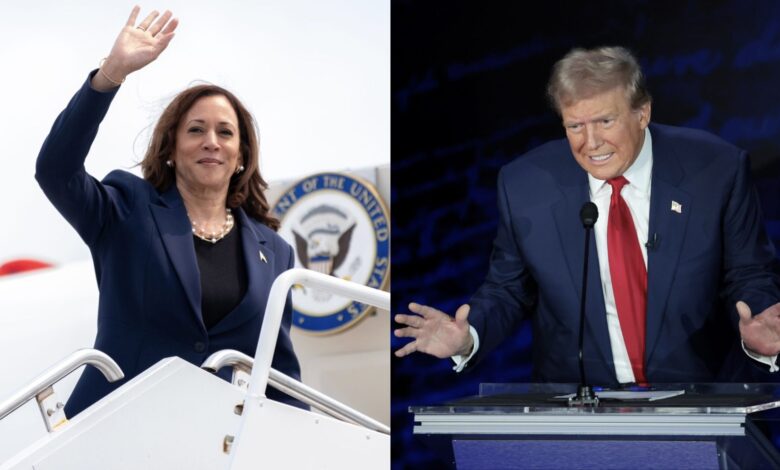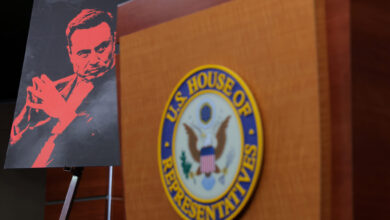A series of polls asked voters not who they will vote for, but who they think will win • Nevada Current

Are you still scouring the internet for new polls and routinely checking polling averages hoping for fresh reassurances but finding precious few?
Are you poring over daily turnout reports from the Nevada Secretary of State’s office – and scanning news on turnout in other battleground states too – hoping scattered gobbets of inconclusive information will alleviate your angst, even though it is just as likely to aggravate it?
Maybe you should stop doing those things.
Alas, if you’ve read this far, you might be one of those souls – the highly engaged voter – for whom polling and turnout data at this point in an election cycle are like an automobile accident or a burning building: looking away is hard.
Sorry.
But there is a thing which, while it can’t rid you of your anxiety and fear and Sturm und Drang, might at least add a different perspective to it.
Yes, of course it’s another poll.
Or more specifically a series of polls.
Sabato’s Crystal Ball, a long-time highly regarded political handicapper connected with the Center for Politics at the University of Virginia, on Wednesday summarized a series of polls conducted during this election cycle that asked respondents not who they will vote for in the presidential election, but who they think will win.
Why? Let’s let the Crystal Ball gazers explain:
“A growing body of evidence indicates that ‘citizen forecasting’ (CF)…makes for more accurate predictions of the winner. Indeed, studies of CF in the United States and the United Kingdom, as well as work on other democracies (such as Canada, France, or Germany) have demonstrated that voter expectations outperform voter intentions in terms of predictive accuracy.”
In other words, “wisdom of crowds” is a thing that’s a thing.
The Crystal Ball’s first survey asking respondents who they thought would win the 2024 presidential election was conducted way back in April, 2023, when Ron DeSantis still looked like a going concern, and when a lot of people hoped Biden wouldn’t run after all (he officially announced his reelection bid near the end of that month).
In the April 2023 polling, 52% of respondents said they thought the Republican candidate would win the presidential election, and 48% said the Democratic candidate would.
The second round of polling wasn’t taken until a year later, in April 2024. By that time, poor DeSantis had been vanquished, Nikki Haley had distinguished her resume by finishing second to “none of these candidates” in the Nevada Republican primary, and the main thing Democrats were saying to each other was “whoa, Biden’s super old but we are stuck with him and we are doomed,” or words to that effect.
Everybody, or almost everybody, assumed it would be a Trump-Biden rerun of 2020. Asked who they thought would win the presidential election, 50% said Trump, and only 38% said Biden, with a mysterious “someone else” or the Kennedy oddity picked by the rest.
The Crystal Ball’s project concluded with a wave of four polls in June, July, August, and September-October.
The June survey, conducted before the June 27 debate that crushed Democrats’ souls and would ultimately end Biden’s candidacy, indicated a close contest – 46% said Trump would win, 42% said Biden would.
The next survey was conducted July 20-22, a week after Trump’s ear got grazed in Pennsylvania, and coinciding, though only partially, with Biden’s announcement he would step aside (June 21). It was the only one of the polls in the series taken after the debate debacle and while Biden was still in the race, and not surprisingly 54% said Trump would win, while only 32% thought Biden would.
The project’s next polling was conducted between August 20-26, about two weeks after Harris had secured the nomination and otherwise astounded a lot of folks by turning out to be very much more of a boss than was widely thought. The script was flipped: Harris would win, said 56% of the August survey respondents, compared to 40% saying Trump would.
The fourth and last wave of polling, between Sept. 20-Oct. 2, had Harris at 55% to Trump’s 42%.
“This current citizen forecast points to a Harris victory in November,” concludes the Crystal Ball’s “Last Sounding” summary published Wednesday.
“Of course, close races are hard to call,” the summary adds, and citizen forecasting isn’t perfect. The Crystal Ball mentions the elections of 2000 and 2016 as examples.
In both those elections the person who won the presidency lost the popular vote. So this year’s surveys, in addition to asking voters who they thought would win, specifically asked them who they thought would win the electoral college, and the majority still expected a Harris victory.
And on the whole, the track record of citizen forecasting of U.S. presidential election results is sort of startlingly good.
The Sabato Crystal Ball and the American National Election Survey combined encompass a record of citizen forecast polling that stretches back to 1956. In every presidential election since then, “whenever the expectation percentage has exceeded 50%, as is the case with the Harris-Trump race, the forecast of the presidential winner has always been correct,” states the summary released Wednesday.
While the most recent polling in the series was conducted roughly a month before Election Day, that’s been the case throughout the history of the polling series, the report adds.
So Democrats can … take a breath?
Fat chance.
What might be considered a variant of citizen forecasting – betting markets – are also often viewed as being a more reliable predictor than traditional polls, and they indicate a much tighter race than the Crystal Ball citizen forecast, with Harris ahead in some, and Trump in others. (There are also segments of the presidential betting market indicating a generous advantage for Trump, though that may not reflect the wisdom of crowds as much as the machinations of crypto-bros.)
About the same time the last polling in the Crystal Ball series was being done, the Cook Political Report also asked voters in battleground states not who they were voting for, but who they thought would win. Harris was ahead in that poll too – 46% said she would win, compared to 39% for Trump. But that’s below the 50% benchmark history cited by the Crystal Ball.
And even given the aforementioned impressive historical track record of citizen forecast polling, if any modern presidential campaign cycle in the modern era has already proven to be wildly different from all the others, it would be this one.
In other words, let the Democratic hand-wringing continue.
Harris would probably approve. She seems like a leader with a zero tolerance policy for complacency.




